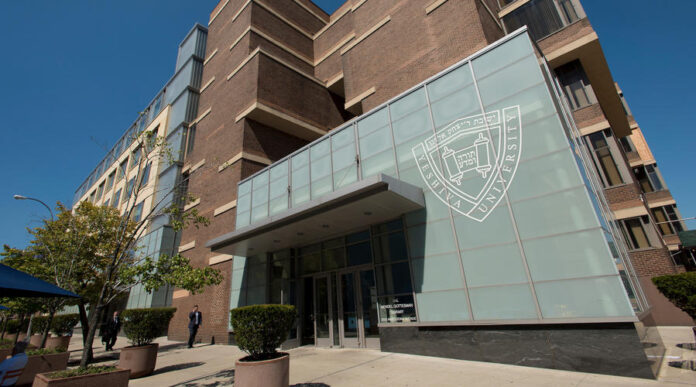
(September 30, 2022 / JNS) The latest exchange in the ongoing battle between Yeshiva University and the YU Pride Alliance, a student LGBTQ club, allowed for at least a temporary ceasefire between the two sides. But the case continues to generate controversy, as the status quo of other recognized groups continuing to operate on the campus, while the gay club still seeks equal treatment, remains.
YU stands a good chance of eventually prevailing if, as expected, a decision on the merits of the case is decided by the U.S. Supreme Court at some point. But even if it does win, it may wind up losing vital support from key donors.
The case has shown that in the conflict between two competing legal rights—that of the school to religious freedom, and that of the gay club not to be discriminated against—the mainstream Jewish world clearly thinks the latter is the more important.
The law may ultimately be on the side of an Orthodox school’s ability to govern itself according to the religious precepts to which it is dedicated. But, judging by the reaction to the case from the organized Jewish world, which has largely distanced itself from one of the country’s leading Jewish institutions, most Jews appear ready to sacrifice that principle. Especially if solidarity with religious Jews means putting them on the wrong side of a dispute in which Jewish law is pitted against gay rights.
While Yeshiva University is a major force in Jewish life, and has an estimated endowment of approximately $800 million, the argument over YU Pride is demonstrating that, when push comes to shove, it is in the same precarious boat as conservative Christian bakers and florists who have found themselves under legal sieges because of their opposition to gay marriage.
Though the courts can and should vindicate its right to run its campus according to Torah principles, the school is discovering that the price of opposing a cultural consensus on gay rights may be far higher than it is willing to pay.
The dispute began with the school’s saying that it would not grant official recognition to the group. This led to a lawsuit, which the club won through a decision by a New York state judge.
The court in question seized on a technicality to rule that since Yeshiva was incorporated as an educational, rather than a religious, institution, the city’s laws forbidding discrimination against gays mandated that it must recognize the club, even if doing so violated the tenants of the Torah.
Yeshiva responded with litigation challenging the ruling as a violation of its right to religious liberty. Its attempt to short circuit the lengthy judicial process by going to the Supreme Court narrowly failed.
The high court ruled 5-4 that Yeshiva must exhaust all of its options for appeal under state laws before turning to it for a ruling. However, Justice Samuel Alito’s dissenting opinion not only made clear how strong Yeshiva’s case was, but he predicted that when, as the case inevitably will, return to the higher body, there is every likelihood that the current 6-3 conservative majority will rule in the school’s favor.
If this legal tangle is ultimately resolved with another reaffirmation of the importance of the First Amendment right of “free exercise” of faith, civil libertarians should applaud. As legal authority and veteran Supreme Court litigator Nathan Lewin wrote in JNS, the law is clearly on the side of the school.
Religious freedom is under assault in an increasingly secular society in which the left seeks not so much to guarantee equal rights for members of the LBGTQ community as it does to crush anyone who dissents on the issue. In his opinion, Alito asked, “Does the First Amendment permit a state to force a Jewish school to instruct its students in accordance with an interpretation of the Torah that the school … has concluded is incorrect?”
His answer was, “Surely, no.”
The other conservative justices are likely to agree and they will be right to do so. If New York can tell Yeshiva to ignore its beliefs and traditions that are rooted in Jewish religious law, then no one’s right to religious freedom, or to disagree with prevailing cultural trends, is safe.
This is more than a legal dispute, of course. By refusing to accept YU Pride, the school has placed itself outside of mainstream cultural thought. While gay marriage used to be a controversial issue—with liberals like former President Barack Obama swearing opposition to it as late as during his 2008 presidential campaign—the pendulum swung very quickly in the other direction.
The mainstreaming of acceptance of gays in popular culture helped pave the way for the Supreme Court’s 2015 Obergefell v. Hodges decision that legalized gay marriage in all 50 states. Almost overnight, opposition to what had been a highly controversial proposition vanished. Few, if any, conservatives have any appetite to relitigate a fight that they know has already been lost.
Those outlier individuals and businesses owned by conservative Christians and Orthodox Jews who continue to dissent have been able to get the courts to defend their right to refuse to be compelled to take part in gay marriages, as in the Masterpiece Cake Shop v. Colorado Civil Rights Commission case.
Yet it is one thing for a lone baker or florist to take such a stand and hope, with the help of courageous legal groups like the Becket Foundation, the Jewish Commission on Law and Public Affairs and the Jewish Coalition for Religious Liberty, to preserve their rights. It is quite another for a major institution like YU, which seeks to play a significant role in the life of the country, to do so.
This was made clear by the news that one of the school’s major donors, the Wilf Family Foundations, for whom Yeshiva’s Washington Heights main campus is named, has weighed in against the school’s stand. That charitable group, which is funded by a family with vast real-estate holdings, as well as control of the National Football League’s Minnesota Vikings, made clear its displeasure, echoing the anger at the university that was expressed by much of its graduate faculty in non-religious subjects.
Yeshiva’s leaders seem to recognize that they have isolated themselves from many of the philanthropic and political forces that they could normally count on to back them. They have been at pains to say that they welcome LGBTQ students and want them to feel welcome, even if they cannot grant official recognition to their clubs or otherwise treat their relationships as kosher.
This is why the silence of most Jewish groups on Yeshiva’s dilemma is so troubling. It’s not just that many liberal groups, such the ADL, seem now to believe that religious freedom is only worth defending if the faith in question is aligned with their secular donors’ beliefs.
By essentially abandoning the school to fight for its rights with only the help of conservatives, they are sending a message that Orthodox Jews are essentially beyond the pale. It’s a signal that those who dissent about gay issues should no longer be treated as equal members of a society that no longer treats their faith as legitimate. That’s not just dangerous for a group that is already the target of an epidemic of anti-Semitic hate crimes. It’s also the end of any pretense that the Jewish community will defend one of its denominations if it falls afoul of liberal fashion.
Thus, even if and when the courts back up YU, it is likely to pay a high price—both where fundraising is concerned and in terms of political isolation—that will have an enormous impact on its future.
You don’t have to agree with the school’s religious principles on this or any other issue to understand that the consequences of making an Orthodox university a pariah in the public square in this manner will ultimately be felt by all people of faith.
Jonathan S. Tobin is editor-in-chief of JNS (Jewish News Syndicate). Follow him on Twitter at: @jonathans_tobin.








